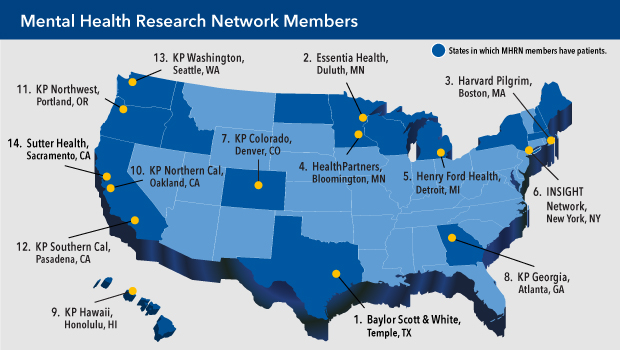
Who We Are
We are a consortium of 14 research centers, embedded in large and diverse healthcare systems, dedicated to improving patient mental health through research, practice, and policy; with expertise in mental health research as well as disciplines such as epidemiology, health services, economics, disparities, outcomes, and quality assessment, and pragmatic clinical trials. Our partner health systems serve a combined population of over 20 million patients or members in 16 states. Core support for MHRN is provided by a cooperative agreement with the National Institute of Mental Health.
Our Mission
As a national model for learning mental healthcare systems, MHRN will:
- Identify research questions that matter to patients, healthcare providers, and healthcare systems
- Efficiently answer those questions with real-world research involving real-world patients and providers
- Rapidly disseminate and implement research results
Our Values
As part of the larger Health Care Systems Research Network (HCSRN), we share the values of:
- Service to patients, caregivers, clinicians, and health system leaders
- Scientific excellence
- Innovation and creativity
- Relevance to real-world decisions
- Collaboration and teamwork
- Transparency
- Efficiency
Latest MHRN Blog Posts
- Population-based outreach to prevent suicide attempts: Too big a step?Our randomized trial of outreach programs to prevent suicide attempts tested a long step beyond what we knew from previous research. We hoped that low-intensity adaptations of proven effective interventions – delivered primarily online – could scale up to prevent suicide attempts at the population level. And we were wrong. Not only did neither of … Continue reading “Population-based outreach to prevent suicide attempts: Too big a step?”
- Population-based outreach to prevent suicide attempts? Now we know.We recently published the results from our large pragmatic trial of outreach programs to prevent suicide attempts. Neither of the programs we tested reduced the risk of self-harm, and one of them (an online program to introduce four skills from Dialectical Behavior Therapy or DBT) appeared to increase risk. We were surprised and disappointed by … Continue reading “Population-based outreach to prevent suicide attempts? Now we know.”
- Can we be passionate and skeptical?During discussions in grant review panels, I’ve often heard an investigator described as “passionate” about their proposed work. That “passionate” label is usually spoken as praise and endorsement. But that word sometimes worries me. We mental health researchers should certainly be passionate about problems we hope to solve. Passion helps us to stay focused on … Continue reading “Can we be passionate and skeptical?”
- Come Sit with Me for a WhileOver the last two months, I’ve helped at some of KP Washington’s weekend COVID-19 vaccination clinics. After a year of pandemic disruption and worry, giving vaccine shots is really a joy. I’ll definitely remember the day we vaccinated over 1,100 schoolteachers. A few weeks ago, I was assigned to the post-vaccination observation area. Watching for … Continue reading “Come Sit with Me for a While”
- The Cautionary Tales of Scott Atlas and Dr. OzThree events in the last month got me thinking about the role that clinicians and researchers (like me) play in the popular media. A group of Stanford faculty recently published an opinion piece in JAMA criticizing Scott Atlas for spreading misinformation and recommending misguided policies regarding the COVID-19 pandemic. They argued (and I agree) that … Continue reading “The Cautionary Tales of Scott Atlas and Dr. Oz”

